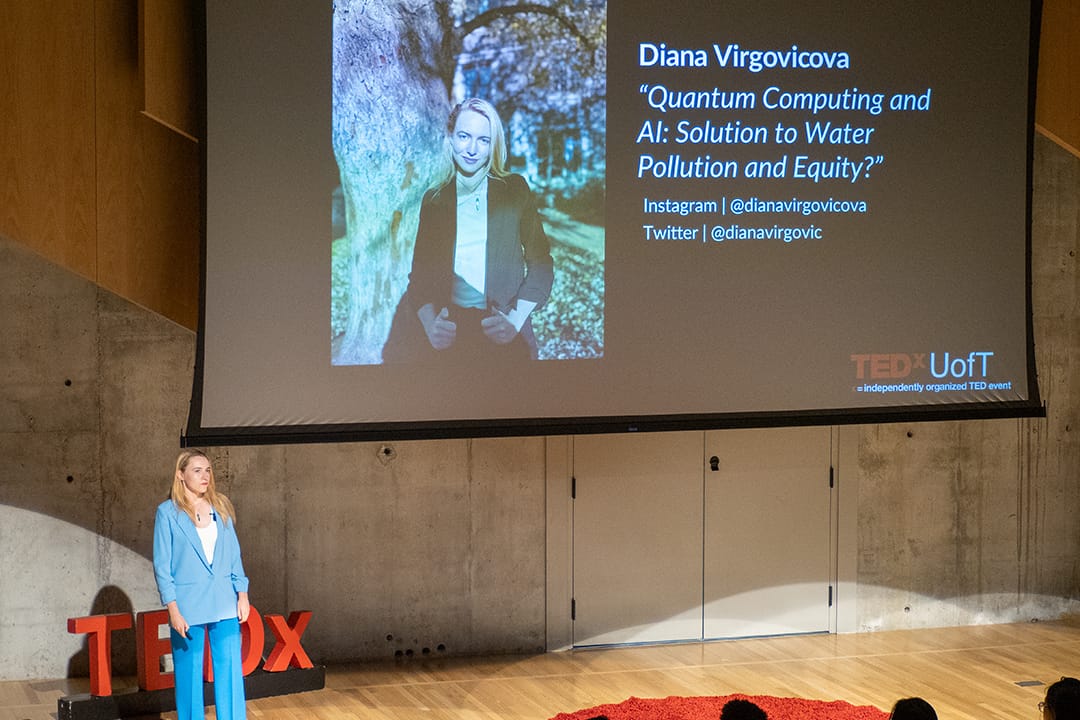The glass may be half empty or half full depending on your perspective, but the stark reality for two billion people is that the glass is polluted. Two billion people don’t have access to safe drinking water, and in many places, people have to walk up to four hours to reach a source of drinkable water. Water pollution is an urgent global issue.
The search for safe water is not only a time-consuming task but also a gendered one, often falling upon the shoulders of women and girls. This unequal burden has far-reaching implications, including hindering educational opportunities for girls and perpetuating gender inequalities.
At the TEDxUofT Salon, U of T Lester B Pearson scholar and founder of the water technology company Xatoms Diana Virgovicova discussed how quantum computing and artificial intelligence (AI) can provide a solution.
Virgovicova’s journey into the world of water sciences and entrepreneurship began during her teenage years. At 14, she visited India for the first time and saw blackened rivers in the suburbs around Mumbai. Confronted with a reality where girls no older than her had to use this polluted water — even during their periods, which put their health at great risk — she spent the next three years studying quantum chemistry to try and help address the issue.
A new molecule
Virgovicova wished to find a photocatalyst: a material that upon absorbing light undergoes a cascade of chemical reactions that disintegrate water pollutants into simple organic compounds. By absorbing certain wavelengths of light, the photocatalysts give rise to highly reactive chemicals, which then undergo chemical reactions that convert emerging water pollutants into carbon dioxide and water.
Virgovicova used quantum chemistry — which provides a theoretical framework to understand the behaviour of atoms and molecules at the quantum level — to design and model potential photocatalytic molecules on computers.
At the age of 17, Virgovicova’s work culminated in the discovery of a novel photocatalyst — an achievement recognized by Princess Victoria of Sweden. Most photocatalysts available at the time worked by absorbing ultraviolet (UV) radiation. This was a major disadvantage: treating water with these photocatalysts would require expensive UV reactors, which subject incoming water to UV light. The new molecule Virgovicova found absorbs visible light to undergo a series of water-purifying reactions. This could make the process of cleaning polluted waters more cost-effective.
Today, Virgovicova’s Xatoms is at the forefront of employing quantum computing and AI for molecular discovery. Traditionally, identifying a molecule required a lot of trial and error. Researchers need to model a large number of molecular permutations. To speed up this process, Xatoms enables them to study larger molecular systems than before and leverages AI to rapidly sift through a vast number of models of photocatalysts.
Using AI and quantum computing technology, Virgovicova explained, can expedite the process of identifying molecules capable of purifying water efficiently, a significant leap from other methods currently used to find photocatalysts.
Beyond this discovery
Beyond her scientific endeavours, Virgovicova is a staunch advocate for gender equality in STEM fields. She highlighted the stark underrepresentation of women in leadership roles within water technology sectors. She believes this discrepancy hampers the development of inclusive and comprehensive solutions to environmental challenges.
The event wasn’t just about presenting problems but also igniting hope and action. Virgovicova’s story is a testament to the power of determination, intellect, and the unwavering pursuit of a better world. Her path wasn’t easy, especially with juggling the challenges of being an international student during the pandemic while kick-starting her venture. Yet, her perseverance paid off in the support she received from notable figures like Alexis Ohanian, a co-founder of Reddit.
Virgovicova emphasizes that developed nations are affected by water pollution. Environmental issues are global and must be treated as such. It is our collective responsibility to speak up and take action.
As the talk concluded, Virgovicova left the audience with a poignant message: every effort counts in the battle against water pollution and in striving for gender equality. She envisioned a world where access to clean water is a norm, not a privilege, and every woman and girl can look to a future filled with possibilities.
Diana Virgovicova’s presentation at the TEDxUofT event was more than just a talk — it was a call to action. Her journey from a curious teenager to a pioneering scientist and entrepreneur is an inspiration to the U of T community and beyond. Her work at Xatoms, combining AI and quantum chemistry, is not just a scientific breakthrough — it’s a blueprint for how technology can be harnessed to address some of the most pressing environmental and social challenges.
As U of T continues to foster innovation and social responsibility among its students and alumni, Virgovicova’s story stands as a beacon, reminding us that the pursuit of knowledge and the drive to make a difference can indeed transform the world.



No comments to display.